TH60102E: Disruptive Technologies in Hospitality Industry Analysis
VerifiedAdded on 2022/09/01
|8
|2076
|20
Essay
AI Summary
This essay delves into the contemporary issues of management within the hospitality sector, focusing on the transformative impact of disruptive technologies. It examines the challenges these technologies, such as online platforms, AI, and VR, pose to traditional business models, including competition from companies like Airbnb and the changing expectations of consumers. Simultaneously, the essay highlights the opportunities for innovation and improved service delivery, such as personalized guest experiences, the use of mobile apps, and the importance of maintaining human interaction alongside technological advancements. The analysis covers the impact on service level provision, emphasizing the need for hotels to adapt to the evolving landscape, manage online reviews, and balance technological integration with the human touch to maintain customer satisfaction and competitive advantage. The essay concludes by emphasizing the need for a proactive and adaptable approach to technology adoption in the hospitality industry.
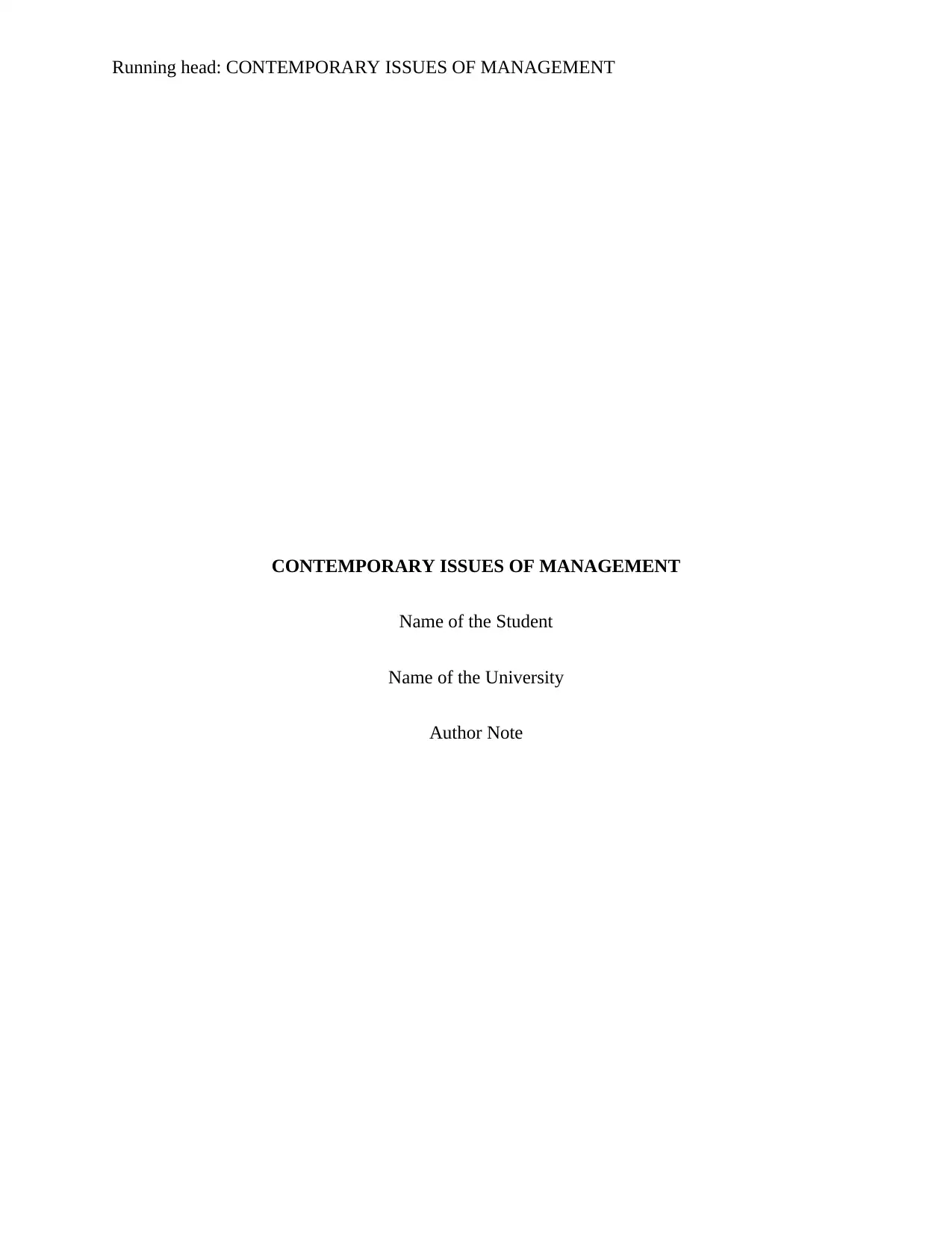
Running head: CONTEMPORARY ISSUES OF MANAGEMENT
CONTEMPORARY ISSUES OF MANAGEMENT
Name of the Student
Name of the University
Author Note
CONTEMPORARY ISSUES OF MANAGEMENT
Name of the Student
Name of the University
Author Note
Paraphrase This Document
Need a fresh take? Get an instant paraphrase of this document with our AI Paraphraser
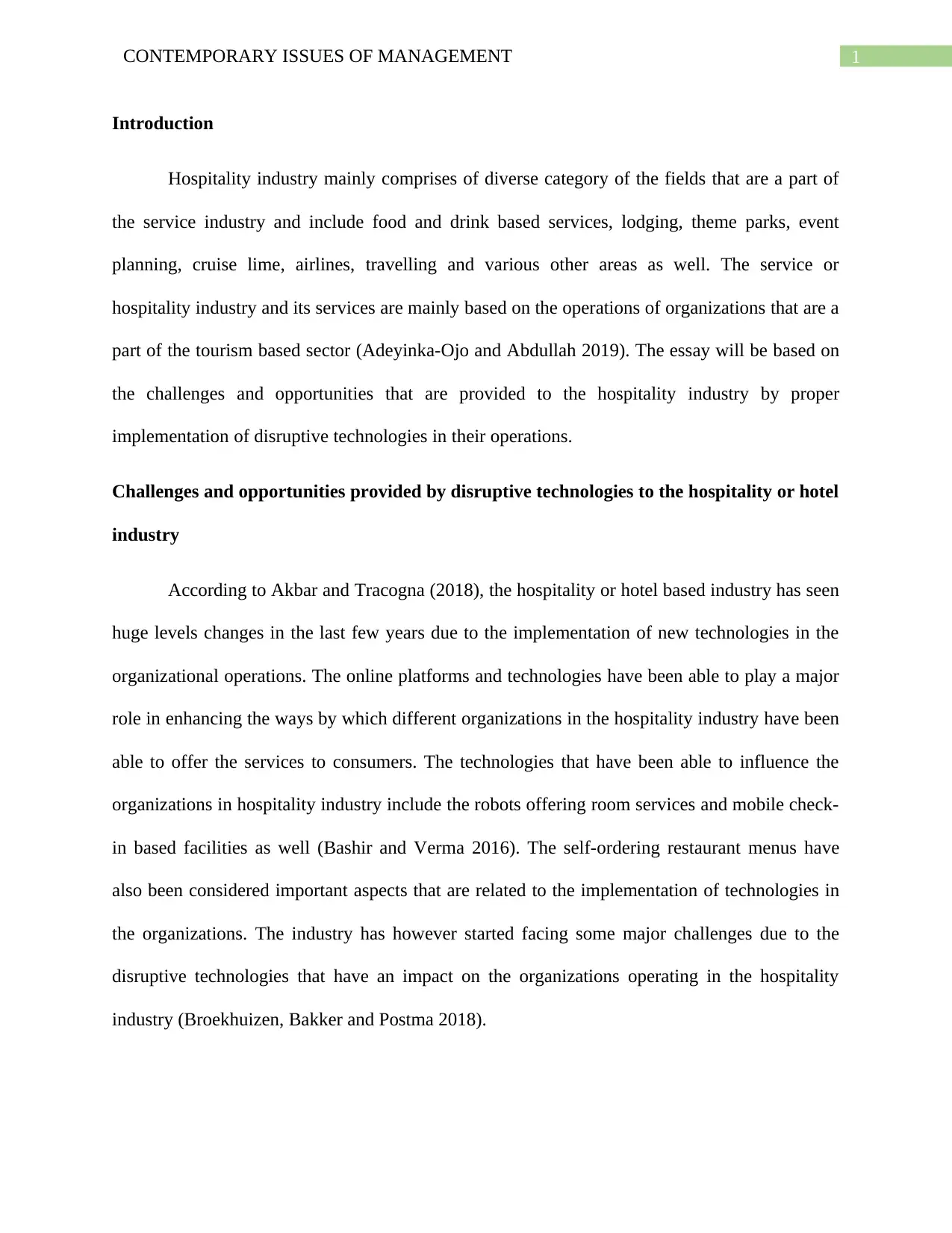
1CONTEMPORARY ISSUES OF MANAGEMENT
Introduction
Hospitality industry mainly comprises of diverse category of the fields that are a part of
the service industry and include food and drink based services, lodging, theme parks, event
planning, cruise lime, airlines, travelling and various other areas as well. The service or
hospitality industry and its services are mainly based on the operations of organizations that are a
part of the tourism based sector (Adeyinka-Ojo and Abdullah 2019). The essay will be based on
the challenges and opportunities that are provided to the hospitality industry by proper
implementation of disruptive technologies in their operations.
Challenges and opportunities provided by disruptive technologies to the hospitality or hotel
industry
According to Akbar and Tracogna (2018), the hospitality or hotel based industry has seen
huge levels changes in the last few years due to the implementation of new technologies in the
organizational operations. The online platforms and technologies have been able to play a major
role in enhancing the ways by which different organizations in the hospitality industry have been
able to offer the services to consumers. The technologies that have been able to influence the
organizations in hospitality industry include the robots offering room services and mobile check-
in based facilities as well (Bashir and Verma 2016). The self-ordering restaurant menus have
also been considered important aspects that are related to the implementation of technologies in
the organizations. The industry has however started facing some major challenges due to the
disruptive technologies that have an impact on the organizations operating in the hospitality
industry (Broekhuizen, Bakker and Postma 2018).
Introduction
Hospitality industry mainly comprises of diverse category of the fields that are a part of
the service industry and include food and drink based services, lodging, theme parks, event
planning, cruise lime, airlines, travelling and various other areas as well. The service or
hospitality industry and its services are mainly based on the operations of organizations that are a
part of the tourism based sector (Adeyinka-Ojo and Abdullah 2019). The essay will be based on
the challenges and opportunities that are provided to the hospitality industry by proper
implementation of disruptive technologies in their operations.
Challenges and opportunities provided by disruptive technologies to the hospitality or hotel
industry
According to Akbar and Tracogna (2018), the hospitality or hotel based industry has seen
huge levels changes in the last few years due to the implementation of new technologies in the
organizational operations. The online platforms and technologies have been able to play a major
role in enhancing the ways by which different organizations in the hospitality industry have been
able to offer the services to consumers. The technologies that have been able to influence the
organizations in hospitality industry include the robots offering room services and mobile check-
in based facilities as well (Bashir and Verma 2016). The self-ordering restaurant menus have
also been considered important aspects that are related to the implementation of technologies in
the organizations. The industry has however started facing some major challenges due to the
disruptive technologies that have an impact on the organizations operating in the hospitality
industry (Broekhuizen, Bakker and Postma 2018).
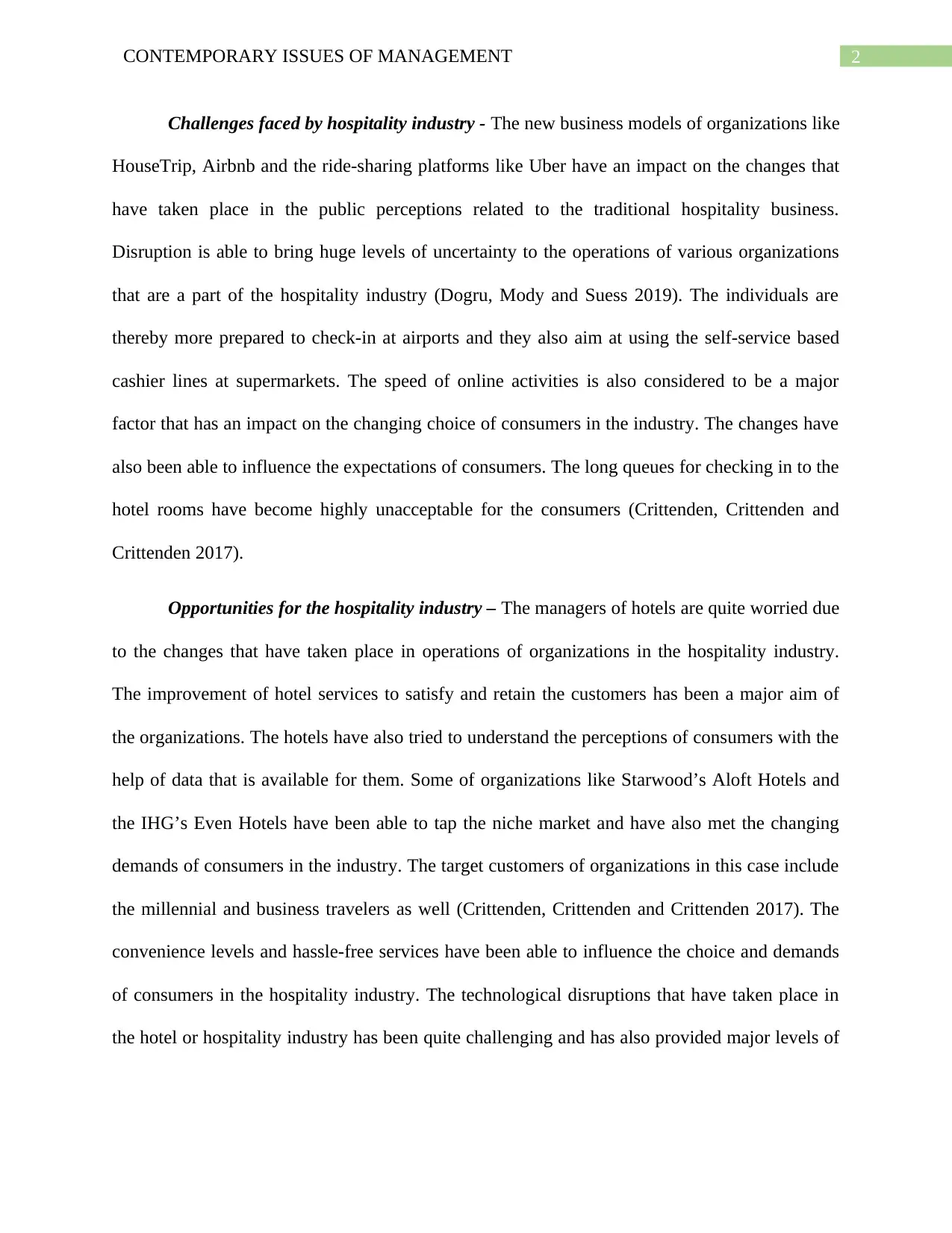
2CONTEMPORARY ISSUES OF MANAGEMENT
Challenges faced by hospitality industry - The new business models of organizations like
HouseTrip, Airbnb and the ride-sharing platforms like Uber have an impact on the changes that
have taken place in the public perceptions related to the traditional hospitality business.
Disruption is able to bring huge levels of uncertainty to the operations of various organizations
that are a part of the hospitality industry (Dogru, Mody and Suess 2019). The individuals are
thereby more prepared to check-in at airports and they also aim at using the self-service based
cashier lines at supermarkets. The speed of online activities is also considered to be a major
factor that has an impact on the changing choice of consumers in the industry. The changes have
also been able to influence the expectations of consumers. The long queues for checking in to the
hotel rooms have become highly unacceptable for the consumers (Crittenden, Crittenden and
Crittenden 2017).
Opportunities for the hospitality industry – The managers of hotels are quite worried due
to the changes that have taken place in operations of organizations in the hospitality industry.
The improvement of hotel services to satisfy and retain the customers has been a major aim of
the organizations. The hotels have also tried to understand the perceptions of consumers with the
help of data that is available for them. Some of organizations like Starwood’s Aloft Hotels and
the IHG’s Even Hotels have been able to tap the niche market and have also met the changing
demands of consumers in the industry. The target customers of organizations in this case include
the millennial and business travelers as well (Crittenden, Crittenden and Crittenden 2017). The
convenience levels and hassle-free services have been able to influence the choice and demands
of consumers in the hospitality industry. The technological disruptions that have taken place in
the hotel or hospitality industry has been quite challenging and has also provided major levels of
Challenges faced by hospitality industry - The new business models of organizations like
HouseTrip, Airbnb and the ride-sharing platforms like Uber have an impact on the changes that
have taken place in the public perceptions related to the traditional hospitality business.
Disruption is able to bring huge levels of uncertainty to the operations of various organizations
that are a part of the hospitality industry (Dogru, Mody and Suess 2019). The individuals are
thereby more prepared to check-in at airports and they also aim at using the self-service based
cashier lines at supermarkets. The speed of online activities is also considered to be a major
factor that has an impact on the changing choice of consumers in the industry. The changes have
also been able to influence the expectations of consumers. The long queues for checking in to the
hotel rooms have become highly unacceptable for the consumers (Crittenden, Crittenden and
Crittenden 2017).
Opportunities for the hospitality industry – The managers of hotels are quite worried due
to the changes that have taken place in operations of organizations in the hospitality industry.
The improvement of hotel services to satisfy and retain the customers has been a major aim of
the organizations. The hotels have also tried to understand the perceptions of consumers with the
help of data that is available for them. Some of organizations like Starwood’s Aloft Hotels and
the IHG’s Even Hotels have been able to tap the niche market and have also met the changing
demands of consumers in the industry. The target customers of organizations in this case include
the millennial and business travelers as well (Crittenden, Crittenden and Crittenden 2017). The
convenience levels and hassle-free services have been able to influence the choice and demands
of consumers in the hospitality industry. The technological disruptions that have taken place in
the hotel or hospitality industry has been quite challenging and has also provided major levels of
⊘ This is a preview!⊘
Do you want full access?
Subscribe today to unlock all pages.

Trusted by 1+ million students worldwide
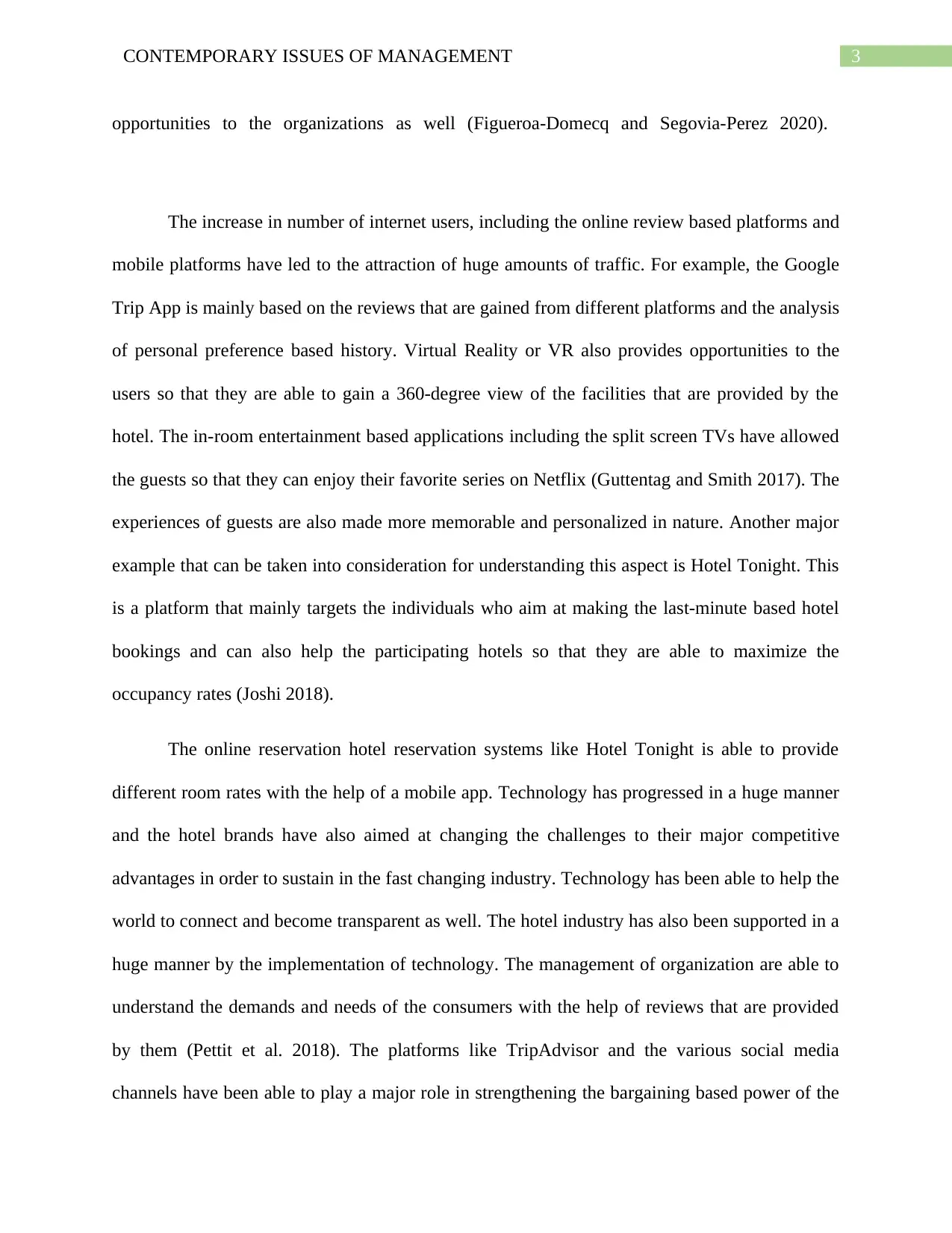
3CONTEMPORARY ISSUES OF MANAGEMENT
opportunities to the organizations as well (Figueroa-Domecq and Segovia-Perez 2020).
The increase in number of internet users, including the online review based platforms and
mobile platforms have led to the attraction of huge amounts of traffic. For example, the Google
Trip App is mainly based on the reviews that are gained from different platforms and the analysis
of personal preference based history. Virtual Reality or VR also provides opportunities to the
users so that they are able to gain a 360-degree view of the facilities that are provided by the
hotel. The in-room entertainment based applications including the split screen TVs have allowed
the guests so that they can enjoy their favorite series on Netflix (Guttentag and Smith 2017). The
experiences of guests are also made more memorable and personalized in nature. Another major
example that can be taken into consideration for understanding this aspect is Hotel Tonight. This
is a platform that mainly targets the individuals who aim at making the last-minute based hotel
bookings and can also help the participating hotels so that they are able to maximize the
occupancy rates (Joshi 2018).
The online reservation hotel reservation systems like Hotel Tonight is able to provide
different room rates with the help of a mobile app. Technology has progressed in a huge manner
and the hotel brands have also aimed at changing the challenges to their major competitive
advantages in order to sustain in the fast changing industry. Technology has been able to help the
world to connect and become transparent as well. The hotel industry has also been supported in a
huge manner by the implementation of technology. The management of organization are able to
understand the demands and needs of the consumers with the help of reviews that are provided
by them (Pettit et al. 2018). The platforms like TripAdvisor and the various social media
channels have been able to play a major role in strengthening the bargaining based power of the
opportunities to the organizations as well (Figueroa-Domecq and Segovia-Perez 2020).
The increase in number of internet users, including the online review based platforms and
mobile platforms have led to the attraction of huge amounts of traffic. For example, the Google
Trip App is mainly based on the reviews that are gained from different platforms and the analysis
of personal preference based history. Virtual Reality or VR also provides opportunities to the
users so that they are able to gain a 360-degree view of the facilities that are provided by the
hotel. The in-room entertainment based applications including the split screen TVs have allowed
the guests so that they can enjoy their favorite series on Netflix (Guttentag and Smith 2017). The
experiences of guests are also made more memorable and personalized in nature. Another major
example that can be taken into consideration for understanding this aspect is Hotel Tonight. This
is a platform that mainly targets the individuals who aim at making the last-minute based hotel
bookings and can also help the participating hotels so that they are able to maximize the
occupancy rates (Joshi 2018).
The online reservation hotel reservation systems like Hotel Tonight is able to provide
different room rates with the help of a mobile app. Technology has progressed in a huge manner
and the hotel brands have also aimed at changing the challenges to their major competitive
advantages in order to sustain in the fast changing industry. Technology has been able to help the
world to connect and become transparent as well. The hotel industry has also been supported in a
huge manner by the implementation of technology. The management of organization are able to
understand the demands and needs of the consumers with the help of reviews that are provided
by them (Pettit et al. 2018). The platforms like TripAdvisor and the various social media
channels have been able to play a major role in strengthening the bargaining based power of the
Paraphrase This Document
Need a fresh take? Get an instant paraphrase of this document with our AI Paraphraser
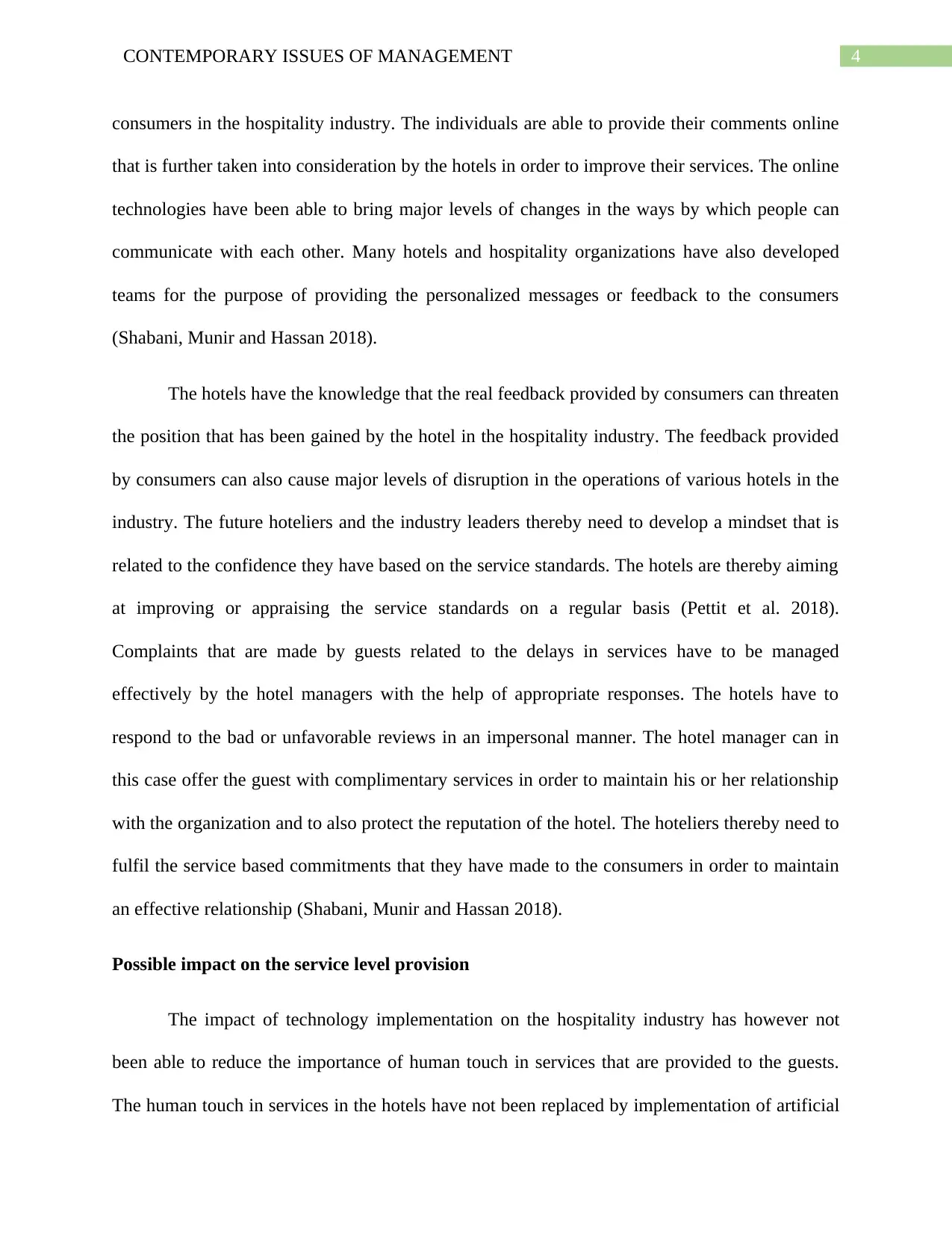
4CONTEMPORARY ISSUES OF MANAGEMENT
consumers in the hospitality industry. The individuals are able to provide their comments online
that is further taken into consideration by the hotels in order to improve their services. The online
technologies have been able to bring major levels of changes in the ways by which people can
communicate with each other. Many hotels and hospitality organizations have also developed
teams for the purpose of providing the personalized messages or feedback to the consumers
(Shabani, Munir and Hassan 2018).
The hotels have the knowledge that the real feedback provided by consumers can threaten
the position that has been gained by the hotel in the hospitality industry. The feedback provided
by consumers can also cause major levels of disruption in the operations of various hotels in the
industry. The future hoteliers and the industry leaders thereby need to develop a mindset that is
related to the confidence they have based on the service standards. The hotels are thereby aiming
at improving or appraising the service standards on a regular basis (Pettit et al. 2018).
Complaints that are made by guests related to the delays in services have to be managed
effectively by the hotel managers with the help of appropriate responses. The hotels have to
respond to the bad or unfavorable reviews in an impersonal manner. The hotel manager can in
this case offer the guest with complimentary services in order to maintain his or her relationship
with the organization and to also protect the reputation of the hotel. The hoteliers thereby need to
fulfil the service based commitments that they have made to the consumers in order to maintain
an effective relationship (Shabani, Munir and Hassan 2018).
Possible impact on the service level provision
The impact of technology implementation on the hospitality industry has however not
been able to reduce the importance of human touch in services that are provided to the guests.
The human touch in services in the hotels have not been replaced by implementation of artificial
consumers in the hospitality industry. The individuals are able to provide their comments online
that is further taken into consideration by the hotels in order to improve their services. The online
technologies have been able to bring major levels of changes in the ways by which people can
communicate with each other. Many hotels and hospitality organizations have also developed
teams for the purpose of providing the personalized messages or feedback to the consumers
(Shabani, Munir and Hassan 2018).
The hotels have the knowledge that the real feedback provided by consumers can threaten
the position that has been gained by the hotel in the hospitality industry. The feedback provided
by consumers can also cause major levels of disruption in the operations of various hotels in the
industry. The future hoteliers and the industry leaders thereby need to develop a mindset that is
related to the confidence they have based on the service standards. The hotels are thereby aiming
at improving or appraising the service standards on a regular basis (Pettit et al. 2018).
Complaints that are made by guests related to the delays in services have to be managed
effectively by the hotel managers with the help of appropriate responses. The hotels have to
respond to the bad or unfavorable reviews in an impersonal manner. The hotel manager can in
this case offer the guest with complimentary services in order to maintain his or her relationship
with the organization and to also protect the reputation of the hotel. The hoteliers thereby need to
fulfil the service based commitments that they have made to the consumers in order to maintain
an effective relationship (Shabani, Munir and Hassan 2018).
Possible impact on the service level provision
The impact of technology implementation on the hospitality industry has however not
been able to reduce the importance of human touch in services that are provided to the guests.
The human touch in services in the hotels have not been replaced by implementation of artificial
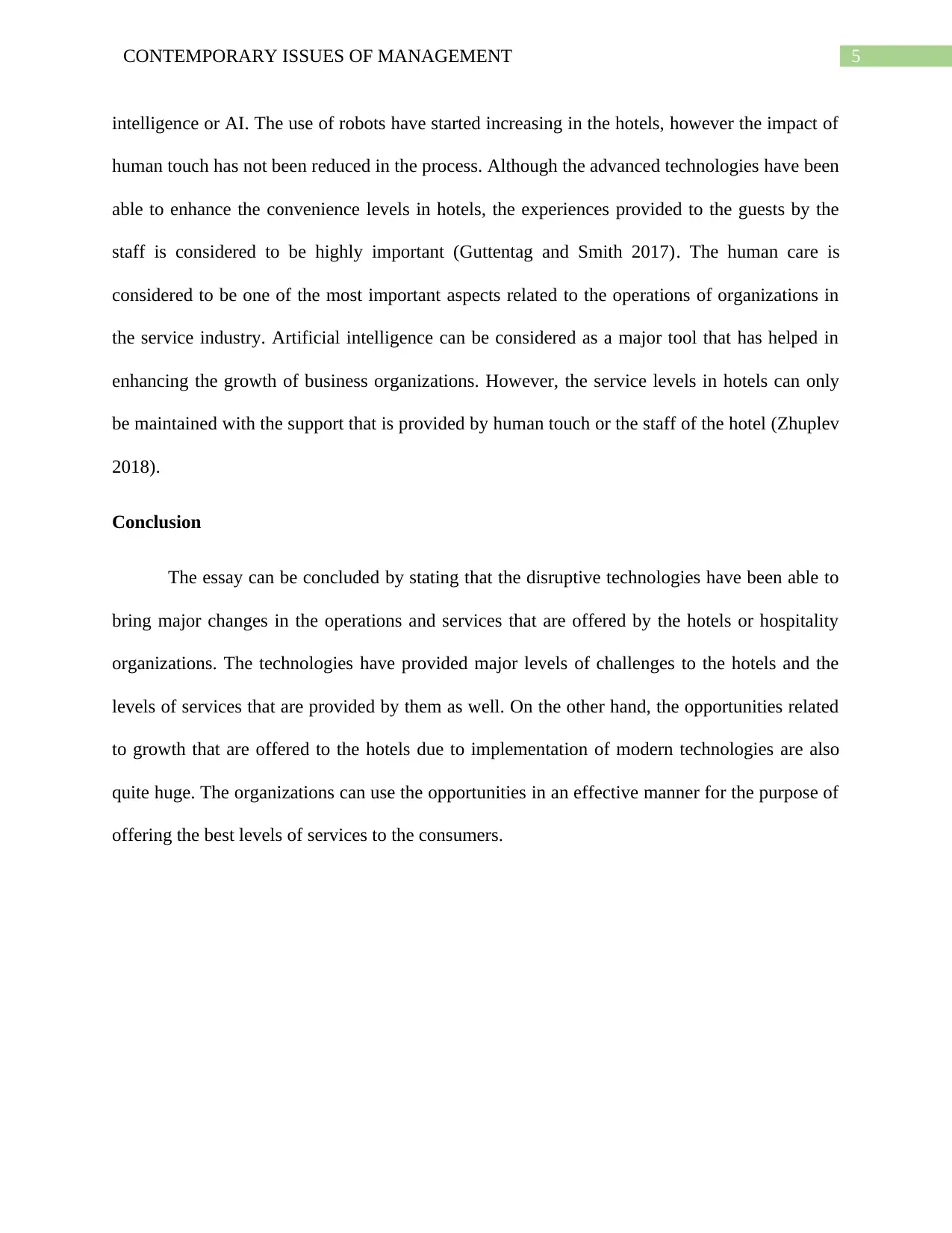
5CONTEMPORARY ISSUES OF MANAGEMENT
intelligence or AI. The use of robots have started increasing in the hotels, however the impact of
human touch has not been reduced in the process. Although the advanced technologies have been
able to enhance the convenience levels in hotels, the experiences provided to the guests by the
staff is considered to be highly important (Guttentag and Smith 2017). The human care is
considered to be one of the most important aspects related to the operations of organizations in
the service industry. Artificial intelligence can be considered as a major tool that has helped in
enhancing the growth of business organizations. However, the service levels in hotels can only
be maintained with the support that is provided by human touch or the staff of the hotel (Zhuplev
2018).
Conclusion
The essay can be concluded by stating that the disruptive technologies have been able to
bring major changes in the operations and services that are offered by the hotels or hospitality
organizations. The technologies have provided major levels of challenges to the hotels and the
levels of services that are provided by them as well. On the other hand, the opportunities related
to growth that are offered to the hotels due to implementation of modern technologies are also
quite huge. The organizations can use the opportunities in an effective manner for the purpose of
offering the best levels of services to the consumers.
intelligence or AI. The use of robots have started increasing in the hotels, however the impact of
human touch has not been reduced in the process. Although the advanced technologies have been
able to enhance the convenience levels in hotels, the experiences provided to the guests by the
staff is considered to be highly important (Guttentag and Smith 2017). The human care is
considered to be one of the most important aspects related to the operations of organizations in
the service industry. Artificial intelligence can be considered as a major tool that has helped in
enhancing the growth of business organizations. However, the service levels in hotels can only
be maintained with the support that is provided by human touch or the staff of the hotel (Zhuplev
2018).
Conclusion
The essay can be concluded by stating that the disruptive technologies have been able to
bring major changes in the operations and services that are offered by the hotels or hospitality
organizations. The technologies have provided major levels of challenges to the hotels and the
levels of services that are provided by them as well. On the other hand, the opportunities related
to growth that are offered to the hotels due to implementation of modern technologies are also
quite huge. The organizations can use the opportunities in an effective manner for the purpose of
offering the best levels of services to the consumers.
⊘ This is a preview!⊘
Do you want full access?
Subscribe today to unlock all pages.

Trusted by 1+ million students worldwide
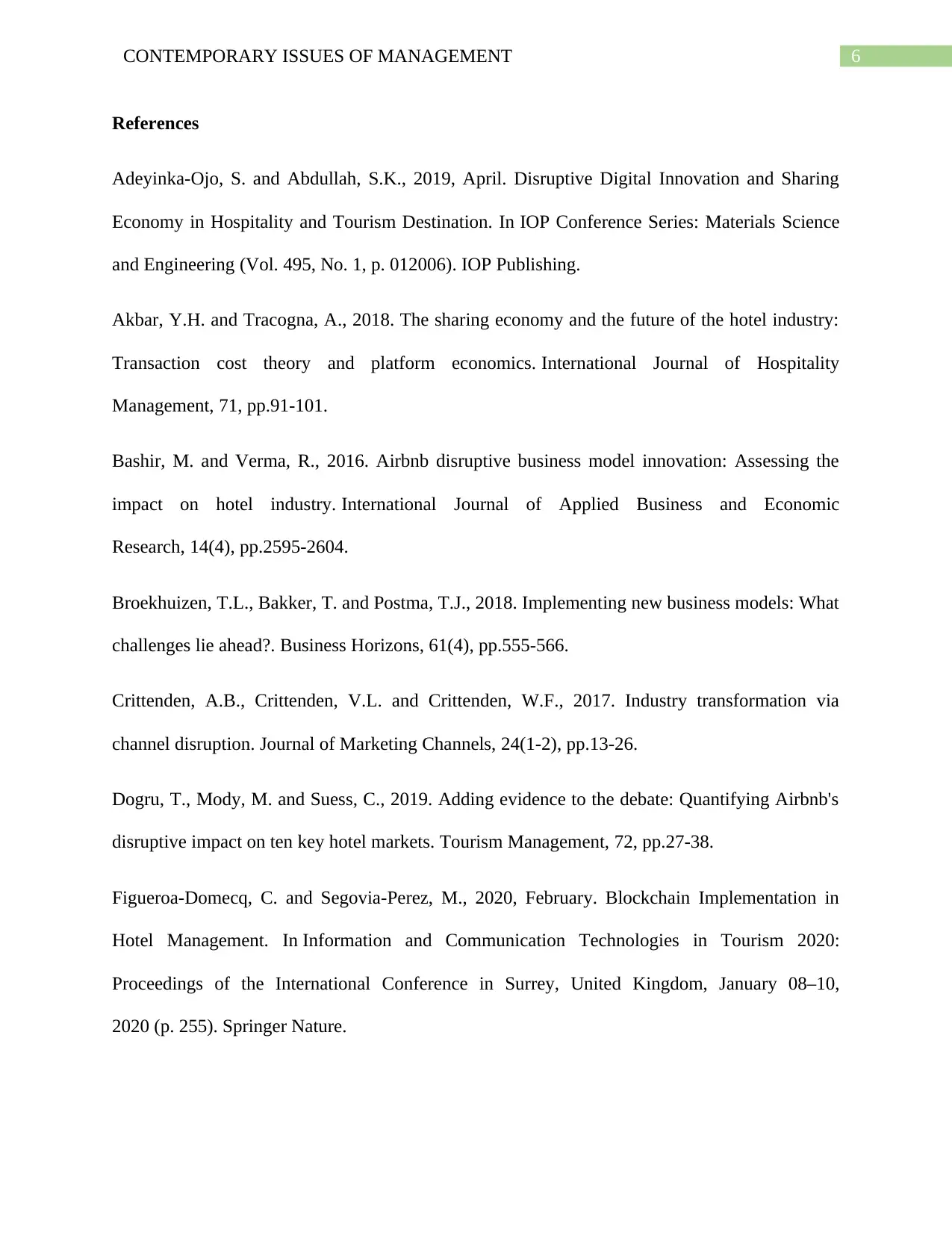
6CONTEMPORARY ISSUES OF MANAGEMENT
References
Adeyinka-Ojo, S. and Abdullah, S.K., 2019, April. Disruptive Digital Innovation and Sharing
Economy in Hospitality and Tourism Destination. In IOP Conference Series: Materials Science
and Engineering (Vol. 495, No. 1, p. 012006). IOP Publishing.
Akbar, Y.H. and Tracogna, A., 2018. The sharing economy and the future of the hotel industry:
Transaction cost theory and platform economics. International Journal of Hospitality
Management, 71, pp.91-101.
Bashir, M. and Verma, R., 2016. Airbnb disruptive business model innovation: Assessing the
impact on hotel industry. International Journal of Applied Business and Economic
Research, 14(4), pp.2595-2604.
Broekhuizen, T.L., Bakker, T. and Postma, T.J., 2018. Implementing new business models: What
challenges lie ahead?. Business Horizons, 61(4), pp.555-566.
Crittenden, A.B., Crittenden, V.L. and Crittenden, W.F., 2017. Industry transformation via
channel disruption. Journal of Marketing Channels, 24(1-2), pp.13-26.
Dogru, T., Mody, M. and Suess, C., 2019. Adding evidence to the debate: Quantifying Airbnb's
disruptive impact on ten key hotel markets. Tourism Management, 72, pp.27-38.
Figueroa-Domecq, C. and Segovia-Perez, M., 2020, February. Blockchain Implementation in
Hotel Management. In Information and Communication Technologies in Tourism 2020:
Proceedings of the International Conference in Surrey, United Kingdom, January 08–10,
2020 (p. 255). Springer Nature.
References
Adeyinka-Ojo, S. and Abdullah, S.K., 2019, April. Disruptive Digital Innovation and Sharing
Economy in Hospitality and Tourism Destination. In IOP Conference Series: Materials Science
and Engineering (Vol. 495, No. 1, p. 012006). IOP Publishing.
Akbar, Y.H. and Tracogna, A., 2018. The sharing economy and the future of the hotel industry:
Transaction cost theory and platform economics. International Journal of Hospitality
Management, 71, pp.91-101.
Bashir, M. and Verma, R., 2016. Airbnb disruptive business model innovation: Assessing the
impact on hotel industry. International Journal of Applied Business and Economic
Research, 14(4), pp.2595-2604.
Broekhuizen, T.L., Bakker, T. and Postma, T.J., 2018. Implementing new business models: What
challenges lie ahead?. Business Horizons, 61(4), pp.555-566.
Crittenden, A.B., Crittenden, V.L. and Crittenden, W.F., 2017. Industry transformation via
channel disruption. Journal of Marketing Channels, 24(1-2), pp.13-26.
Dogru, T., Mody, M. and Suess, C., 2019. Adding evidence to the debate: Quantifying Airbnb's
disruptive impact on ten key hotel markets. Tourism Management, 72, pp.27-38.
Figueroa-Domecq, C. and Segovia-Perez, M., 2020, February. Blockchain Implementation in
Hotel Management. In Information and Communication Technologies in Tourism 2020:
Proceedings of the International Conference in Surrey, United Kingdom, January 08–10,
2020 (p. 255). Springer Nature.
Paraphrase This Document
Need a fresh take? Get an instant paraphrase of this document with our AI Paraphraser
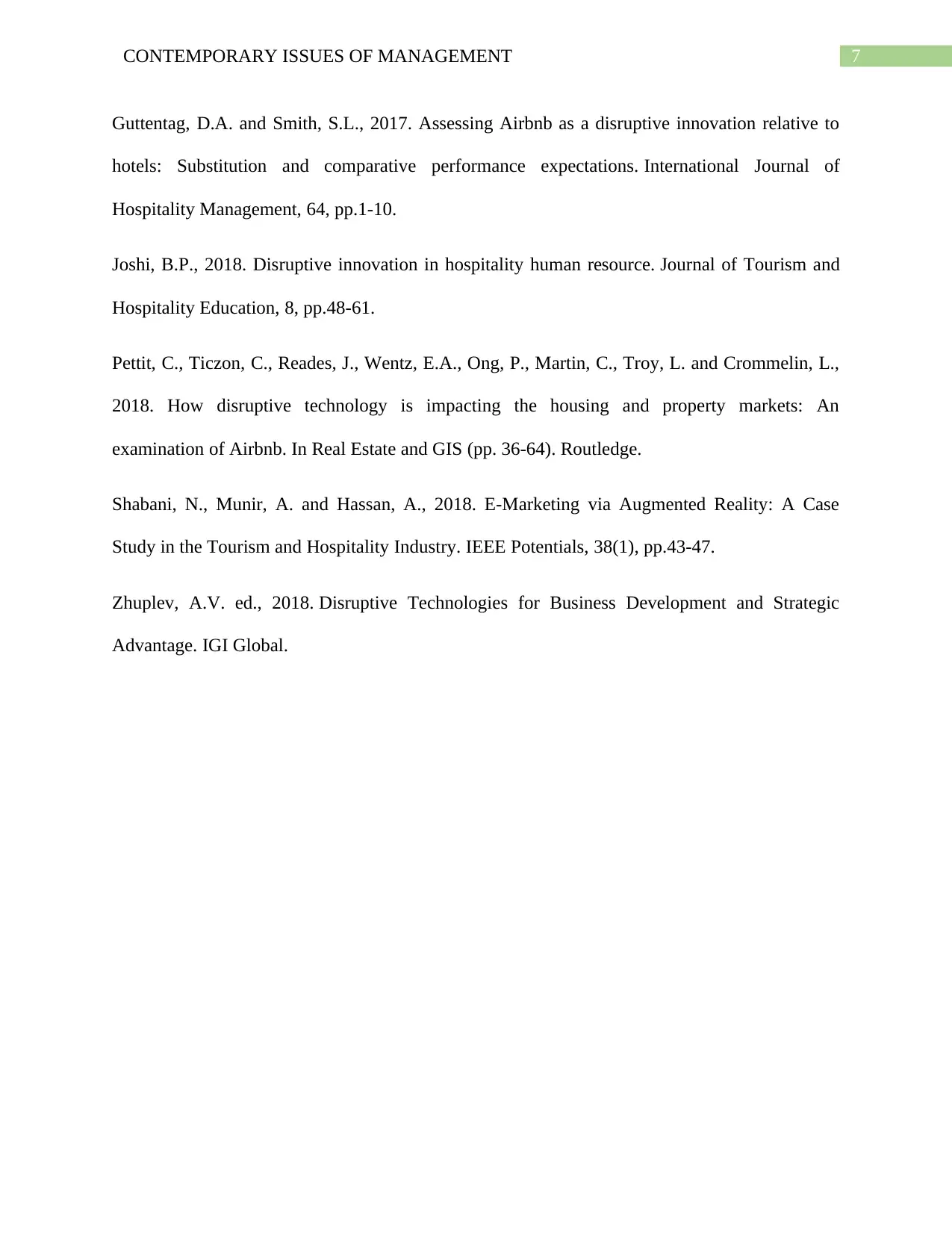
7CONTEMPORARY ISSUES OF MANAGEMENT
Guttentag, D.A. and Smith, S.L., 2017. Assessing Airbnb as a disruptive innovation relative to
hotels: Substitution and comparative performance expectations. International Journal of
Hospitality Management, 64, pp.1-10.
Joshi, B.P., 2018. Disruptive innovation in hospitality human resource. Journal of Tourism and
Hospitality Education, 8, pp.48-61.
Pettit, C., Ticzon, C., Reades, J., Wentz, E.A., Ong, P., Martin, C., Troy, L. and Crommelin, L.,
2018. How disruptive technology is impacting the housing and property markets: An
examination of Airbnb. In Real Estate and GIS (pp. 36-64). Routledge.
Shabani, N., Munir, A. and Hassan, A., 2018. E-Marketing via Augmented Reality: A Case
Study in the Tourism and Hospitality Industry. IEEE Potentials, 38(1), pp.43-47.
Zhuplev, A.V. ed., 2018. Disruptive Technologies for Business Development and Strategic
Advantage. IGI Global.
Guttentag, D.A. and Smith, S.L., 2017. Assessing Airbnb as a disruptive innovation relative to
hotels: Substitution and comparative performance expectations. International Journal of
Hospitality Management, 64, pp.1-10.
Joshi, B.P., 2018. Disruptive innovation in hospitality human resource. Journal of Tourism and
Hospitality Education, 8, pp.48-61.
Pettit, C., Ticzon, C., Reades, J., Wentz, E.A., Ong, P., Martin, C., Troy, L. and Crommelin, L.,
2018. How disruptive technology is impacting the housing and property markets: An
examination of Airbnb. In Real Estate and GIS (pp. 36-64). Routledge.
Shabani, N., Munir, A. and Hassan, A., 2018. E-Marketing via Augmented Reality: A Case
Study in the Tourism and Hospitality Industry. IEEE Potentials, 38(1), pp.43-47.
Zhuplev, A.V. ed., 2018. Disruptive Technologies for Business Development and Strategic
Advantage. IGI Global.
1 out of 8
Related Documents
Your All-in-One AI-Powered Toolkit for Academic Success.
+13062052269
info@desklib.com
Available 24*7 on WhatsApp / Email
![[object Object]](/_next/static/media/star-bottom.7253800d.svg)
Unlock your academic potential
Copyright © 2020–2025 A2Z Services. All Rights Reserved. Developed and managed by ZUCOL.




